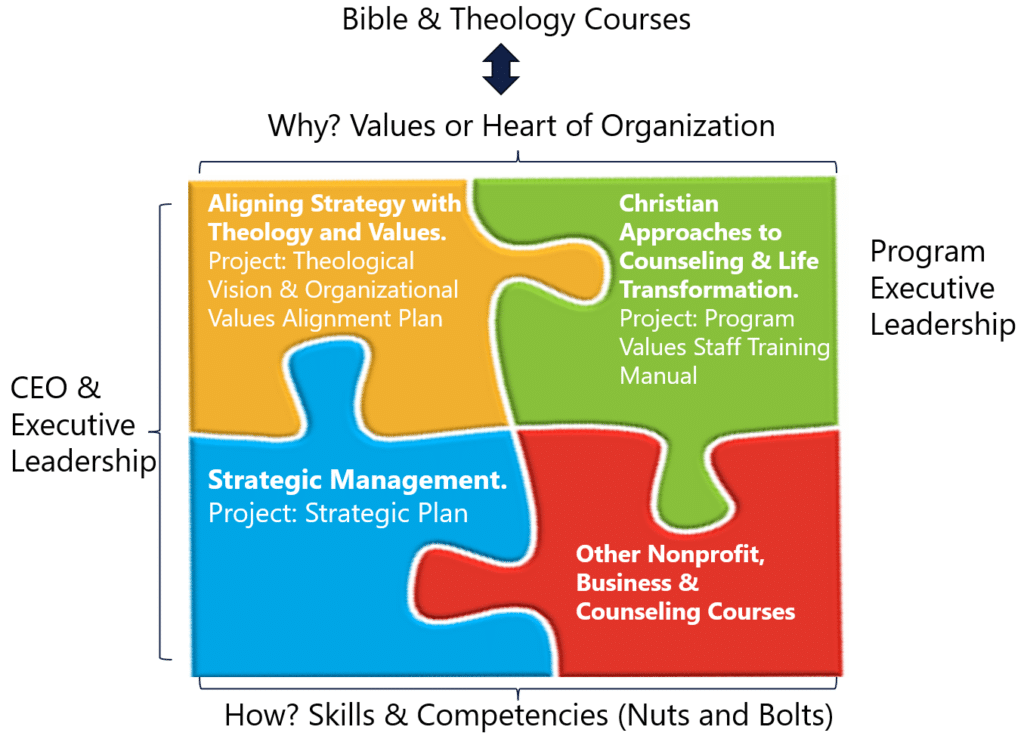Course Syllabus
MIN640: Aligning Strategy with Theology and Values
Instructor & Contact Information
The People tab in Canvas provides information on the course instructor and you can send a message to your instructor following these instructions. Faculty are expected to: 1) grade and return assignments, with feedback, within 7 days from the date of submission; 2) reply to your Canvas messages within 72 hours; 3) reply several times each week in total in the discussion forums (not to each individual student); and 4) demonstrate the core values of City Vision University.
Course Description
As society and the needs ministries face are rapidly changing, often we need to update our strategies based on the new context. To adapt without secularizing, it is critical that ministries conduct deep reflection on their values and theology to develop a theological vision to guide this process. This course will help students create a theological vision for their organization consisting of an inspirational understanding of its mission, vision and values that fits with their context. This will then be used as a guide to ensure that the organization’s strategy is aligned with its theology and values.
Is a project based course with the final project to develop a Plan to Operationalize Values and Avoid Mission Drift based on the Operationalizing Values & Avoiding Mission Drift Ministry Best Practices Checklist.
You can see how this course relates to other courses in the slide below.

Organizational Requirements
This course requires that a student identify an urban ministry, urban mission or other Christian ministry serving those who are poor, recovering from addiction or an otherwise disadvantaged population. The student will need to be able to interview and collect documents from the organization to understand how their vision and values direct how they do ministry. Because of the theological nature of this course, students must work with a Christian organization. Because a major focus of this course is to resist secularization tendencies, for some of the assignments, it may be helpful if the ministry comes from a theologically conservative framework (because they typically are more concerned about avoiding secularization).
Course Outcomes
After completing this course, you will be able to:
1. Identify common ways in which Christian organizations drift from their original missions and secularize.
2. Assess an organization’s current theological and values alignment using the Wesleyan quadrilateral of Scripture, tradition, reason, and experience.
3. Develop an applied theological vision for an organization that includes a Scripturally aligned and culturally contextualized understanding of its mission, vision and values.
4. Justify the choices made in the organization’s strategic plan, organizational culture and structure based on the theological vision and values.
Degree Program Outcomes
Degree outcomes are the overall skills and knowledge we expect you will have after successfully completing a degree program at City Vision University. This course supports the following program outcomes, marked with an asterisk (*). After completing the degree, you will be able to do the following in each of the listed domains:
- Bible & Theology. Use sound principles of Biblical interpretation and Christian theology to understand the structure, themes and content of the Bible and apply and communicate that well in local contexts.
- Applied Theology. Develop a theological vision that is a faithful restatement of the gospel with transformative power in a particular culture at a moment in history. *
- Vocation. Create plans to achieve your own personal vocation and calling as well as bringing social change to the world in line with Christian values.
- Spiritual Formation for Healthy Leadership. Develop plans for inner character development and outer strategies needed for healthy leadership & organizations.
- Cross-Cultural Ministry. Develop strategy for effective cross-cultural management and ministry and apply that to your own organizational or ministry context.
- Organizational Skills. Demonstrate professional competencies in a specialty area appropriate for leadership roles in nonprofit organizations and ministries.
- Strategy. Integrate a wide range of organizational leadership skills into a strategic plan for developing an organization centered around a biblical philosophy of ministry for your context. *
Required Texts
Students are required to purchase these texts before the first day of classes.
-
Greer, P., Horst, C., Haggard, A., & Crouch, A. (2015). Mission Drift: The Unspoken Crisis Facing Leaders, Charities, and Churches (Reprint edition). Bethany House Publishers.
Students will select one additional book related to practical theology in their context. A list of suggested books will be added below.
Guidelines for Written Work
All written work must follow our Writing Format and Forum Requirements. You must read these to understand how to cite sources appropriately.
Critical Policies to Read for This Course
Note: These policies are critical for all students to read. In case of change, we have linked to the versions on our website to make sure you have the latest version.
Additional Policies:
This syllabus is subject to change without notice up until the first day of the semester. Last updated: December 30, 2024
Course Summary:
| Date | Details | Due |
|---|---|---|